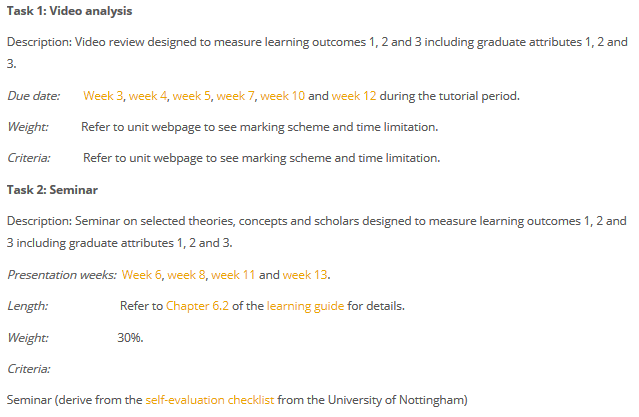Main points in the IR202 unit outline
The unit IR202 Theories of International Relations is an introductory unit. The unit aims to help you understand the importance of the main theories that define international relations as a the sub field of political science.
The aim of this blog post is to highlight the main points in the unit outline. The unit outline is available on the Moodle unit webpage as a page resource module. You will need to visit the webpage and read the unit outline including the learning guide.
There are so many theories, older theories as well as new emerging theories. The unit will focus on four selected theories:
- Realism
- Liberalism
- Constructivism
- English School Theory
The factor of time is the main reason why only 4 theories were selected out of the many. If you are interested in learning about the other theories then you have the required readings at your disposal. After reading, you can see me for further discussion to help you understand during my consultation hours.
Another reason is based on my own opinion, I see these 4 theories as the main theories. Realism and Liberalism are older theories but Constructivism and the English School Theory are new and interesting. Constructivism talks about social norms while the English School Theory is a fusion of realism and liberalism. Scholars are still researching and working on developing new theories.
Most importantly, there are 3 major learning outcomes that defines the learning limitation of the unit. This means that the content of this unit will be structured towards achieving the 3 learning outcomes. After completing the unit, you will be able to:
- Determine the importance of studying the four selected theories of international relations.
- Identify and categorize the different scholars into their respective theoretical premises.
- Apply the four selected theories of international relations to help understand the behaviour of states and non-state actors in the international system.
That means you will study the work of notable scholars who
once played a part or are currently contributing to the evolution of the
sub field. People like Thomas Hobbes, Stephen Krasner, Edward Hallet
Carr and Hans Morgenthau contributed to the growth of Realism as a
theory. Morgenthau talked about the nine element of national power in
his work 'Politics among nations: the struggle for power and peace'. He
outlined that the quest, maintenance, and exhibition of power defines
the type of foreign policy a state pursues.
Also, you will use the main theories and concepts associated with the theories to help
explain scientifically the behaviour of primary actors like states and
non-state actors in the international system. The Rise and Fall variant
of Realism can be used to explain the behaviour of China as a rising
power. The current trade war between China and America can be viewed as a
preventive war. America cannot continue to allow the Chinese economy to
grow rapidly because eventually China will challenge American hegemony.
Apart from the 3 learning outcomes, the content of the unit is also structured towards developing 3 selected graduate attributes:
- Social interaction - demonstrate the ability to work productively, both autonomously and co-operatively, with tolerance, respect and valuing for human diversity, but also with a passionate commitment to truth.
- Communication - have excellent communication skills, in written and oral language, and understand and use English as the most widely used language of international scholarship as well as respecting the linguistic diversity of PNG.
- Information technology - have experienced the use of archives and libraries and the application of a range of computer software, particularly software appropriate to their disciplinary area, and established receptiveness to the expanding opportunities for electronic technology.
In the first assessment task, you have to create a podcast as a group using the Audacity software. The podcast will be an analysis of a video that you and your group will watch during the 2 hours tutorial period. As a group you all must answer the review questions, create the podcast and upload onto the assigned Moodle forum before the end of the tutorial. This assessment task will help you develop all 3 graduate attributes.
Furthermore, you will be required to give a 10 minutes seminar presentation on your selected theory, concept or scholar. Before the seminar, you will need to submit supporting documents in written, audio and audiovisual form. The array of learning resources that you need to create will help you to minimize the amount of information you put on your presentation slides and the time you need to present orally. This assessment will help you develop the 3 graduate attributes.
 |
| Assessment task segment on unit outline webpage |
The teaching and learning strategy is traditional. There will be 6 lectures and 6 tutorial activities including 4 seminar presentation sessions. The lectures, tutorials and seminar sessions are arranged in a logical manner and are based on the topics. For the topic of Realism, we will begin with the lecture and then do the tutorial activity in the first week. In the second week, you will present your seminar on realist concepts and scholars. The same will happen for the other 3 theories, we will spend two weeks each to discuss the 4 theories.
On a weekly basis you will have learning activities to do, check the unit webpage to see the program or I call it my learning map. This is in line with the underpinning principles of 'promoting active learning' and 'learner-centred approaches' outlined in the DWU Teaching and Learning Policy.
Finally, make sure you monitor critically my strategy. Tell me at the end of the semester, during the unit evaluation, whether it helped you to achieve the 3 learning outcomes and develop the 3 graduate attributes.
Please, once again, read carefully the unit outline and the learning guide to note other vital details not mentioned in this blog article.
Comments
Post a Comment